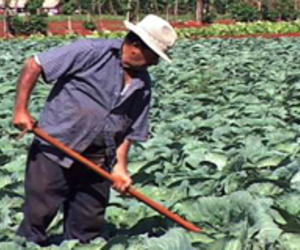Cubans begin to enjoy making money
- Submitted by: manso
- Editorial Articles
- 05 / 07 / 2011

By Mary Murray Producer. NBC News NBC News. updated 5/6/2011 10:37:25 AM ET 2011-05-06T14:37:25
HAVANA — Wealth sticks out like a sore thumb in Cuba, especially with a person like Orlando – who has amassed a small fortune for over 20 years – and lives in Cuba’s generally humble countryside.
Orlando's three-story stone white house with its hand carved wooden doors and tar paved driveway sits in shiny stark contrast to the surrounding homes, most of which are four-room small rectangles topped with thatched roofs and marked by exterior walls badly in need of a splash of paint.
So, for the record, Orlando is not his real name. For the most part, no one’s real name is used in this story about enterprising Cubans who have worked the system for years just to get by, some to thrive, and who hope to continue doing so in the future – legally.
He grows and sells food.
However, under the nation's constitution, individuals are banned from employing others, an act judged as “exploitation.” Violators face heavy fines and the confiscation of their property.
But just a few months ago, Cuba's pragmatic president, Raul Castro, pushed to modify that communist principle, since the country needs to offer alternative sources of employment to offset massive layoffs. About 1 million skilled and professional workers are scheduled to lose their state jobs by 2016 as Havana tries to tackle the country's fiscal crisis.
The family farmer said he never set out to flout the law. “How was I supposed to harvest all this without help?” he asked, standing among acres of garlic, sweet potatoes, carrots and onions.
Orlando hires most of his employees on a seasonal basis to harvest land that has been in his family for generations. The farmhands also plant and pick produce on newly acquired fields Orlando leases from the Cuban government.
Orlando is one of 140,000 private farmers participating in a government program to cultivate crops on what had previously been barren state land.
Some private farmers grow export crops like tobacco and coffee but many, like Orlando, form part of the country’s drive to become self-sufficient in food production – to cut costly food imports while putting affordable provisions on the Cuban table. At the time the program began, in 2008, some 51 percent of Cuba’s arable land – about 9 million acres – was underused.
Castro’s idea of assisting private growers counts as another radical change in direction from the communist government, which had urged farmers since the 1960s to transfer their farms to the state or merge their lands into agricultural collectives.
Cubans take baby steps to reform — and hope they don't trip up
A portion of what Orlando grows is purchased by the state for public hospitals and school cafeterias.
Orlando’s family also hawks part of the yield from rustic stands set up along the back roads between the capital and the countryside.
But the bulk gets sold to middlemen who travel to the farm three times a week and haul the produce in private trucks back to the city to sell in urban markets.
Unlike small farmers in other parts of the world who often struggle to cover costs, Orlando's family makes a solid living from the land. In fact,private farmers here are some of society’s most affluent.
And Orlando has invested wisely, with holdings that flow beyond the fence circling his farm.
His adult sons manage a fleet of taxis; the family also dabbles in retail and quietly finances a handful of local eateries.
He says life is good but he does have one hefty gripe – he’s not able to spend his money without worrying about who may be looking over his shoulder.
He needs a new tractor but the only ones for sale that he knows of are stolen property – from either a state farm or a cooperative. Orlando won’t take the chance.
But his big dream is to one day be able march into a Mercedes Benz dealership to buy a new shiny full-size luxury sedan. “I would like a gold-colored one,” he said.
And if that time ever comes, when Cubans are allowed to purchase cars without first having to get a paper from the government authorizing the sale, this savvy businessman plans to pay cash.
Underground entrepreneurs
Orlando is not the only Cuban entrepreneur who operates along the edge of the law.
Carlos and Kenya run an upscale B&B near Havana’s international airport. Officially their license only authorizes them to rent rooms to other Cubans, primarily locals needing a place to sleep before catching an early morning flight.
Off the books, they cater to Italian and Spanish tourists.
The married couple, in their late 30s, also operates a private car service and a neighborhood coffee shop. And for the last three years, they have been flipping real estate.
They get around Cuba’s restrictive property laws by buying and selling in other people’s names and, they also admit, greasing a slew of government housing lawyers and inspectors.
Neither went to college; they quit their jobs in the state sector 10 years ago to become their extended family’s principal breadwinners. Today they earn more than they can spend, something few Cubans can boast about.
‘Not in my lifetime’
People like Orlando, Carlos and Kenya, all support the notion of a free market economy yet hold little hope that the government plans to make such sweeping changes that Cuba would abandon its socialist path.
“Honestly, I’ll be happy if I could continue making money without breaking the law,” Carlos said.
Source: www.msnbc.msn.com/id/42865436/ns/world_news-americas/
Comments